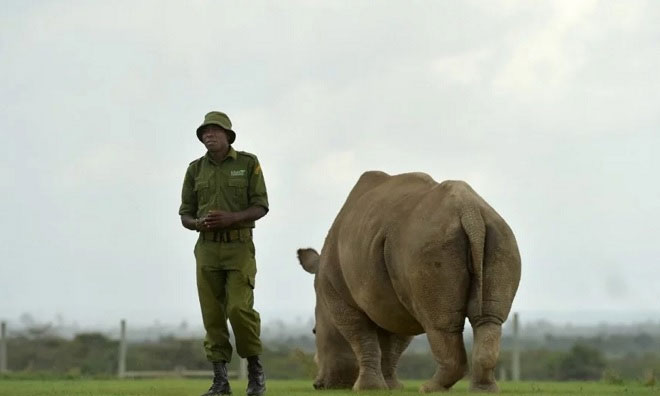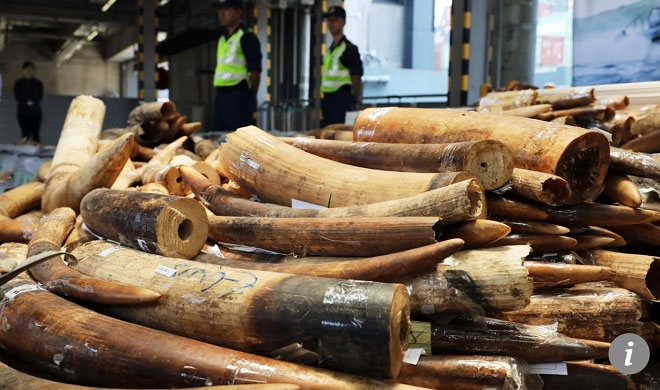The male north white rhinoceros finally died and the message sent to China
African witnesses say illegal wildlife trade has caused widespread disaster, after China eased the ban.
According to the South China Morning Post (SCMP), James Mwenda, a conservation officer in Kenya, came to Hong Kong this week to send a message about a friend's death.
On March 19, the last male took his last breath at age 45, after a long period of severe illness at the conservation center in Kenya.

James Mwenda stood beside one of the last two northern white rhino horns.
What remains of this rhino is two female rhinos.'Male rhino death is my message , ' Mwenda said. 'I say what rhino can't say.'
Last month, China relaxed its ban on trade in rhino and tiger bone horns after 25 years. Trading activities are limited to the purpose of scientific research, cultural heritage trafficking and 'related therapeutic effects'.
The demand for rhino horn and tiger bones is huge in China because of the belief that it can cure the disease, although there is no scientific evidence to prove this.
Rhino horns are made from keratin, a substance similar to human hair and nails. Activists say China's easing of the ban will lead to "terrible consequences".
Mwenda also agrees: 'This decision threatens our wildlife . It is sad to see the dark side of people, it is greed.'
Mwenda is in Hong Kong from November 12 to 17 to participate in events that emphasize how negative wildlife trade is in Africa.

The number of Hong Kong customs ivory seized.
Hong Kong is considered the largest ivory market in the world, leading to the killing of 30,000 African elephants every year. Currently only about 350,000 elephants in Africa, compared with 490,000 a decade ago.
Hunting is the main cause of this sharp decline.
Gabon, a country in Central Africa is a country with huge natural resources, with vast forests and 800km of coastline, is home to whales and dolphins.
Gabon now accounts for 60% of the elephants living in the forest worldwide. In the 1980s, Gabon had 65,000 forest elephants. But now, the country has lost a third, while Africa has lost 75% in 15 years.
Ivory beside rhino horns and tiger bones is what poachers are constantly searching for.
With rhinos, one kilogram of horns costs up to $ 60,000 and this figure is $ 2,000 / kg with ivory. These are the most valuable things that poachers ignore the law to make a profit, according to SCMP.
Mwenda hopes everyone will recognize the threat to African wildlife and act to reverse the worst-case scenario.
'If we don't try to protect the wild environment, now and in the future, there will be nothing in the future,' Mwenda warns.
- The last male North African white rhinoceros died
- White rhinoceros is at high risk of extinction
- Death of Sudanese white rhino and warning to all humanity
- The only male white rhinoceros on Earth
- The first southern white rhinoceros was born by IVF
- Discover rhinoceros fossils Rhinoceros siensis near Ruc people
- Compose a lie message that takes more time
- The only male white rhino left in the world
- Get the eggs from the last two individual white rhino on Earth
- The white lion is rarely born at the American zoo
- Find the apocalyptic message of genius Leornado Da Vinci?
- The phenomenon of mysterious dead birds in China
 Animal 'suffering' after hibernation
Animal 'suffering' after hibernation Why do goats climb well?
Why do goats climb well? Scientists were surprised to see chimpanzees eating turtles
Scientists were surprised to see chimpanzees eating turtles Giant catfish died deadly due to drought in Thailand
Giant catfish died deadly due to drought in Thailand